
Jane Austen (1775-1817) Study Objectives: 1.Understand literary term of Realism. 2.Appreciate Jane Austen's narrative style. 3.Learn to understand Austen's view on marriage. Understanding the Author: IANE AUSTEN (1775181) English literature of early 19th century was mainly an age of poetry.The predominant literary mode was Romanticism,which was expressed almost entirely in poetry.This period saw little development in drama and produced some major novelists such as Sir Walter Scott,a pioneer of historical novels,and Jane Austen,whose works critique the novels of sensibility of the second half of the 18th century and are part of the transition to 19th-century literary realism. Although Austen belonged to the 19th century,she was closer to the 18thcentury predecessors in both moral outlook and prose style.She is a neo-classicism!advocator and believes in order, Neoclassicism is a type of classicism which draws its name from its finding in classical literature of ancient Greek and Roman writers.It dominated English literature in the Restoration Age and in 18"century.The neoclassicists believed that the artistic ideals should be order,logic,restrained emotion and accuracy.They followed some fixed laws and rules in literature.Poetry should be lyrical,epical,dialectic,satiric and dramatic. Prose should be precise,direct,smooth and flexible.Drama should be written in heroic couplet;the three unities of time,space and action should be strictly observed
Jane Austen (1775-1817) Study Objectives: 1. Understand literary term of Realism. 2. Appreciate Jane Austen’s narrative style. 3. Learn to understand Austen’s view on marriage. Understanding the Author: English literature of early 19 th century was mainly an age of poetry. The predominant literary mode was Romanticism, which was expressed almost entirely in poetry. This period saw little development in drama and produced some major novelists such as Sir Walter Scott, a pioneer of historical novels, and Jane Austen, whose works critique the novels of sensibility of the second half of the 18th century and are part of the transition to 19th-century literary realism. Although Austen belonged to the 19 th century, she was closer to the 18 th century predecessors in both moral outlook and prose style. She is a neo-classicism1 advocator and believes in order, 1 Neoclassicism is a type of classicism which draws its name from its finding in classical literature of ancient Greek and Roman writers. It dominated English literature in the Restoration Age and in 18 th century. The neoclassicists believed that the artistic ideals should be order, logic, restrained emotion and accuracy. They followed some fixed laws and rules in literature. Poetry should be lyrical, epical, dialectic, satiric and dramatic. Prose should be precise, direct, smooth and flexible. Drama should be written in heroic couplet; the three unities of time, space and action should be strictly observed

reason,accuracy and gracefulness Jane Austen completed six major novels,Northanger Abbey,Sense and Sensibility,Pride and Prejudice,Mansfield Park,Emma and Persuasion,which describe a narrow range of society and events,mainly about the lives of middle class circle in provincial surroundings.Her subject matter is primarily about the young leisure class lady's intention to get married.Though her subject matter,character range,moral,physical and social setting and plots are restricted to the 19th century England gentry life,she can deal with the recurring situations with absolute accuracy and sureness,allowing a closer analysis of characters.It is no exaggeration to say that within her limited sphere,Austen is unequalled. Austen's novels are brightened by her tight plotting,witty conversation and omnipresent humor.Her stories are skillfully woven together;her plots never leave the path of realism,and have always been sensible.Her language is graceful,elegant,and refined,but never showy. Pride and Prejudice combines romance with a sensitive portrait of a young woman's development and offers an honest and realistic depiction of a change in English society as it affected people in their everyday lives.For most readers,the novel is a romantic love story with a Cinderella conclusion in which the provincial heroine marries one of the most eligible bachelors of the realm.It is a realistic portrayal of a particular segment of late 18th century society,its conventions,and its values.Austen begins by focusing on the injustices of an entail system that denies inheritance to the female heirs.She exposes the desperation of women whose sole sense of security resides in the marriage contract. Understanding Realism: Realism is a literary movement in the writing of novels during the 19th century that included writers such as Honore de Balzac in France,Charles Dickens in England and William Dean Howells in America.Writers of this category strive to represent life as it really is.Realistic fiction is written to give the effect that it represents life and the social world as it seems to the common reader,evoking the sense that its characters might in fact exist,and that such things might well happen.To achieve such effects,realistic writers may prefer the commonplace and the everyday, represented in minute detail,and they render their materials in ways that make them the very stuff of ordinary experience. The beginnings of the realist narrative style can be attributed to French novelist and playwright Honore de Balzac.His portraits of ordinary French life are remarkable in his careful attention to details.He expresses the idea that characters come to life through the painstaking accumulation of environmental details and puts enormous emphasis on the settings of his stories
reason, accuracy and gracefulness. Jane Austen completed six major novels, Northanger Abbey, Sense and Sensibility, Pride and Prejudice, Mansfield Park, Emma and Persuasion, which describe a narrow range of society and events, mainly about the lives of middle class circle in provincial surroundings. Her subject matter is primarily about the young leisure class lady’s intention to get married. Though her subject matter, character range, moral, physical and social setting and plots are restricted to the 19 th century England gentry life, she can deal with the recurring situations with absolute accuracy and sureness, allowing a closer analysis of characters. It is no exaggeration to say that within her limited sphere, Austen is unequalled. Austen’s novels are brightened by her tight plotting, witty conversation and omnipresent humor. Her stories are skillfully woven together; her plots never leave the path of realism, and have always been sensible. Her language is graceful, elegant, and refined, but never showy. Pride and Prejudice combines romance with a sensitive portrait of a young woman’s development and offers an honest and realistic depiction of a change in English society as it affected people in their everyday lives. For most readers, the novel is a romantic love story with a Cinderella conclusion in which the provincial heroine marries one of the most eligible bachelors of the realm. It is a realistic portrayal of a particular segment of late 18 th century society, its conventions, and its values. Austen begins by focusing on the injustices of an entail system that denies inheritance to the female heirs. She exposes the desperation of women whose sole sense of security resides in the marriage contract. Understanding Realism: Realism is a literary movement in the writing of novels during the 19 th century that included writers such as Honoré de Balzac in France, Charles Dickens in England and William Dean Howells in America. Writers of this category strive to represent life as it really is. Realistic fiction is written to give the effect that it represents life and the social world as it seems to the common reader, evoking the sense that its characters might in fact exist, and that such things might well happen. To achieve such effects, realistic writers may prefer the commonplace and the everyday, represented in minute detail, and they render their materials in ways that make them the very stuff of ordinary experience. The beginnings of the realist narrative style can be attributed to French novelist and playwright Honoré de Balzac. His portraits of ordinary French life are remarkable in his careful attention to details. He expresses the idea that characters come to life through the painstaking accumulation of environmental details and puts enormous emphasis on the settings of his stories
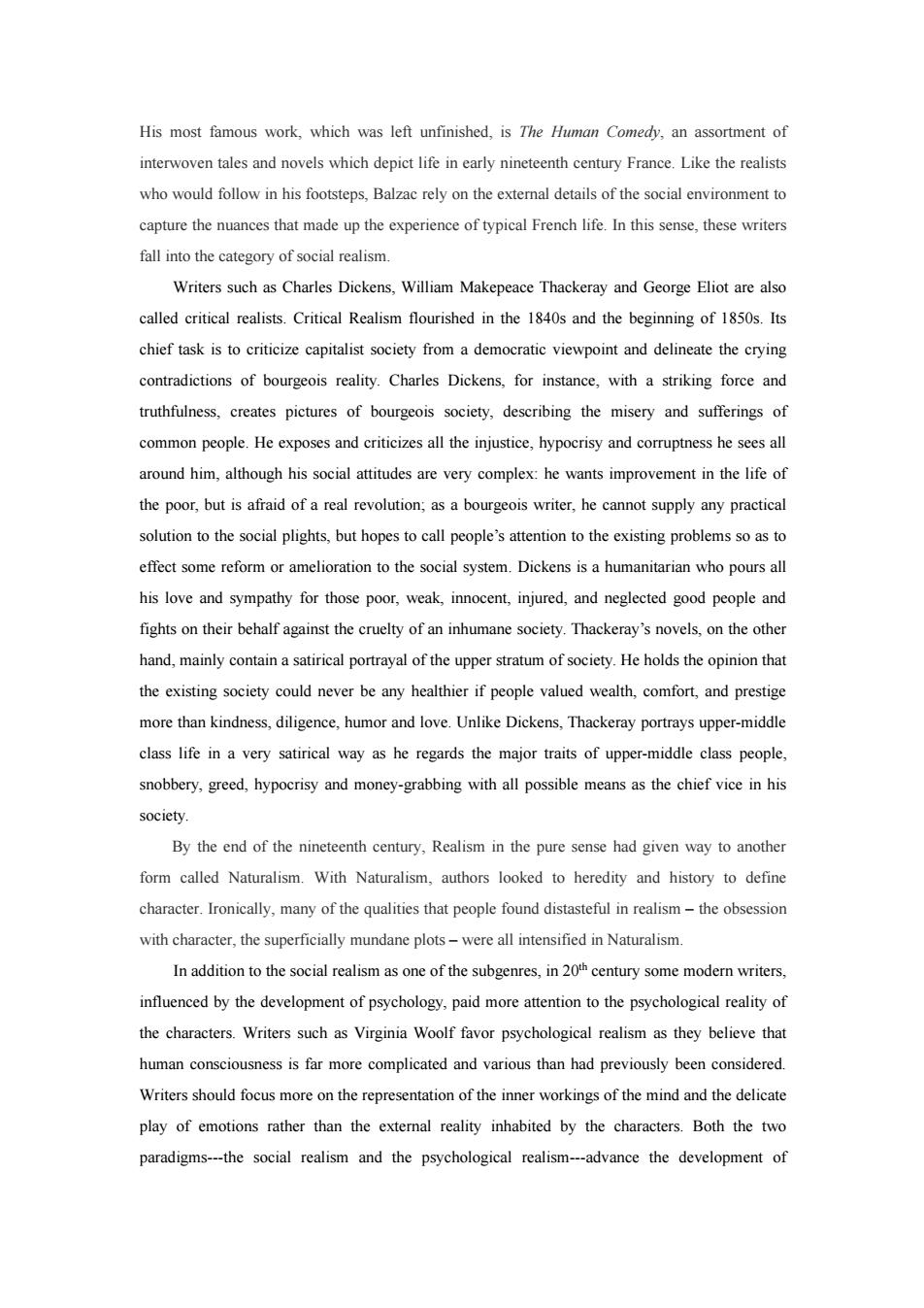
His most famous work,which was left unfinished,is The Human Comedy,an assortment of interwoven tales and novels which depict life in early nineteenth century France.Like the realists who would follow in his footsteps,Balzac rely on the external details of the social environment to capture the nuances that made up the experience of typical French life.In this sense,these writers fall into the category of social realism. Writers such as Charles Dickens,William Makepeace Thackeray and George Eliot are also called critical realists.Critical Realism flourished in the 1840s and the beginning of 1850s.Its chief task is to criticize capitalist society from a democratic viewpoint and delineate the crying contradictions of bourgeois reality.Charles Dickens,for instance,with a striking force and truthfulness,creates pictures of bourgeois society,describing the misery and sufferings of common people.He exposes and criticizes all the injustice,hypocrisy and corruptness he sees all around him,although his social attitudes are very complex:he wants improvement in the life of the poor,but is afraid of a real revolution;as a bourgeois writer,he cannot supply any practical solution to the social plights,but hopes to call people's attention to the existing problems so as to effect some reform or amelioration to the social system.Dickens is a humanitarian who pours all his love and sympathy for those poor,weak,innocent,injured,and neglected good people and fights on their behalf against the cruelty of an inhumane society.Thackeray's novels,on the other hand,mainly contain a satirical portrayal of the upper stratum of society.He holds the opinion that the existing society could never be any healthier if people valued wealth,comfort,and prestige more than kindness,diligence,humor and love.Unlike Dickens,Thackeray portrays upper-middle class life in a very satirical way as he regards the major traits of upper-middle class people, snobbery,greed,hypocrisy and money-grabbing with all possible means as the chief vice in his society. By the end of the nineteenth century,Realism in the pure sense had given way to another form called Naturalism.With Naturalism,authors looked to heredity and history to define character.Ironically,many of the qualities that people found distasteful in realism-the obsession with character,the superficially mundane plots-were all intensified in Naturalism. In addition to the social realism as one of the subgenres,in 20th century some modern writers, influenced by the development of psychology,paid more attention to the psychological reality of the characters.Writers such as Virginia Woolf favor psychological realism as they believe that human consciousness is far more complicated and various than had previously been considered. Writers should focus more on the representation of the inner workings of the mind and the delicate play of emotions rather than the external reality inhabited by the characters.Both the two paradigms---the social realism and the psychological realism---advance the development of
His most famous work, which was left unfinished, is The Human Comedy, an assortment of interwoven tales and novels which depict life in early nineteenth century France. Like the realists who would follow in his footsteps, Balzac rely on the external details of the social environment to capture the nuances that made up the experience of typical French life. In this sense, these writers fall into the category of social realism. Writers such as Charles Dickens, William Makepeace Thackeray and George Eliot are also called critical realists. Critical Realism flourished in the 1840s and the beginning of 1850s. Its chief task is to criticize capitalist society from a democratic viewpoint and delineate the crying contradictions of bourgeois reality. Charles Dickens, for instance, with a striking force and truthfulness, creates pictures of bourgeois society, describing the misery and sufferings of common people. He exposes and criticizes all the injustice, hypocrisy and corruptness he sees all around him, although his social attitudes are very complex: he wants improvement in the life of the poor, but is afraid of a real revolution; as a bourgeois writer, he cannot supply any practical solution to the social plights, but hopes to call people’s attention to the existing problems so as to effect some reform or amelioration to the social system. Dickens is a humanitarian who pours all his love and sympathy for those poor, weak, innocent, injured, and neglected good people and fights on their behalf against the cruelty of an inhumane society. Thackeray’s novels, on the other hand, mainly contain a satirical portrayal of the upper stratum of society. He holds the opinion that the existing society could never be any healthier if people valued wealth, comfort, and prestige more than kindness, diligence, humor and love. Unlike Dickens, Thackeray portrays upper-middle class life in a very satirical way as he regards the major traits of upper-middle class people, snobbery, greed, hypocrisy and money-grabbing with all possible means as the chief vice in his society. By the end of the nineteenth century, Realism in the pure sense had given way to another form called Naturalism. With Naturalism, authors looked to heredity and history to define character. Ironically, many of the qualities that people found distasteful in realism – the obsession with character, the superficially mundane plots – were all intensified in Naturalism. In addition to the social realism as one of the subgenres, in 20 th century some modern writers, influenced by the development of psychology, paid more attention to the psychological reality of the characters. Writers such as Virginia Woolf favor psychological realism as they believe that human consciousness is far more complicated and various than had previously been considered. Writers should focus more on the representation of the inner workings of the mind and the delicate play of emotions rather than the external reality inhabited by the characters. Both the two paradigms---the social realism and the psychological realism---advance the development of
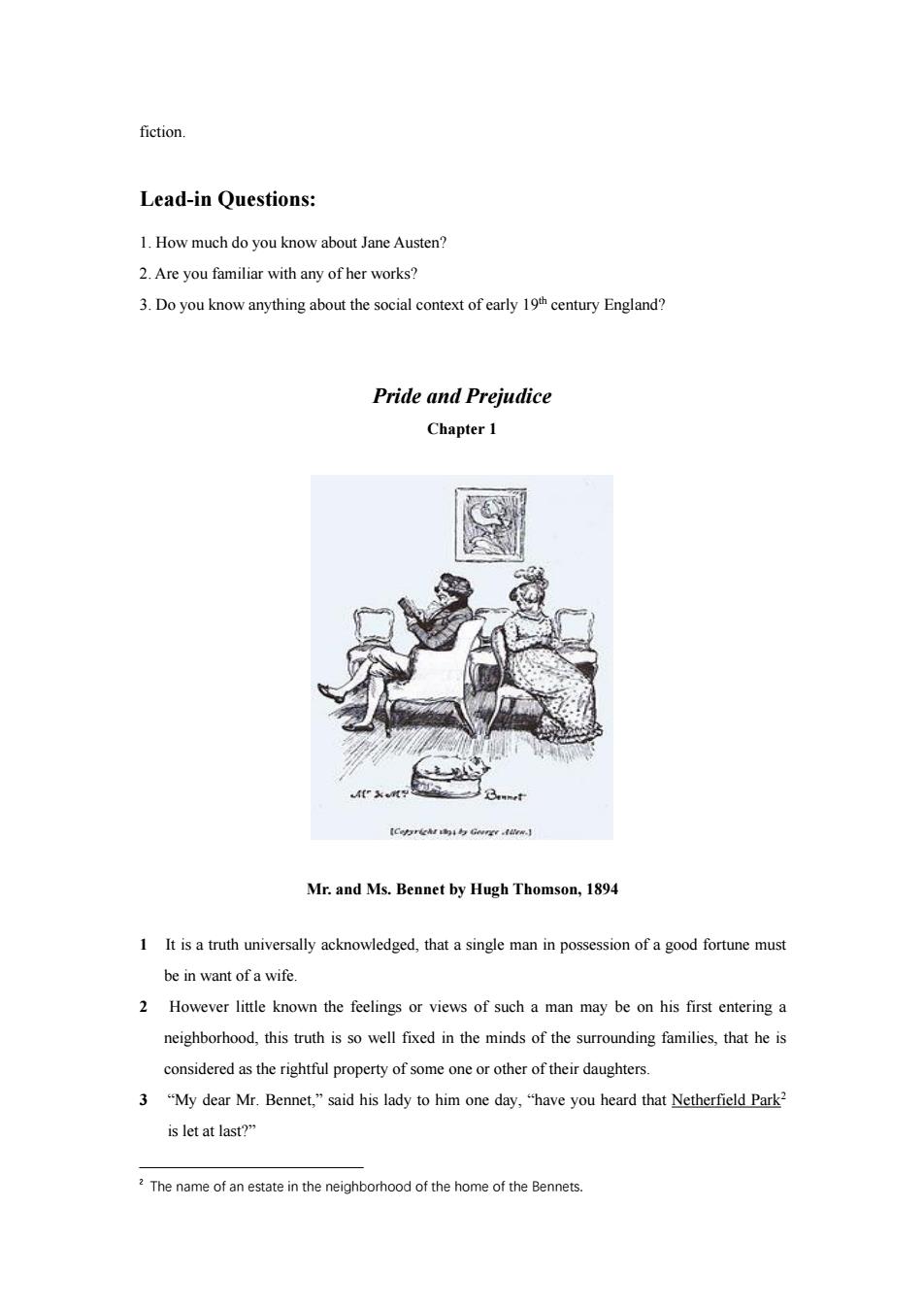
fiction Lead-in Questions: 1.How much do you know about Jane Austen? 2.Are you familiar with any of her works? 3.Do you know anything about the social context of early 19th century England? Pride and Prejudice Chapter 1 【Ceparich4与Gw,l Mr.and Ms.Bennet by Hugh Thomson,1894 1 It is a truth universally acknowledged,that a single man in possession of a good fortune must be in want of a wife. 2 However little known the feelings or views of such a man may be on his first entering a neighborhood,this truth is so well fixed in the minds of the surrounding families,that he is considered as the rightful property of some one or other of their daughters. 3 "My dear Mr.Bennet,"said his lady to him one day,"have you heard that Netherfield Park2 is let at last?” 2 The name of an estate in the neighborhood of the home of the Bennets
fiction. Lead-in Questions: 1. How much do you know about Jane Austen? 2. Are you familiar with any of her works? 3. Do you know anything about the social context of early 19 th century England? Pride and Prejudice Chapter 1 Mr. and Ms. Bennet by Hugh Thomson, 1894 1 It is a truth universally acknowledged, that a single man in possession of a good fortune must be in want of a wife. 2 However little known the feelings or views of such a man may be on his first entering a neighborhood, this truth is so well fixed in the minds of the surrounding families, that he is considered as the rightful property of some one or other of their daughters. 3 “My dear Mr. Bennet,” said his lady to him one day, “have you heard that Netherfield Park 2 is let at last?” 2 The name of an estate in the neighborhood of the home of the Bennets
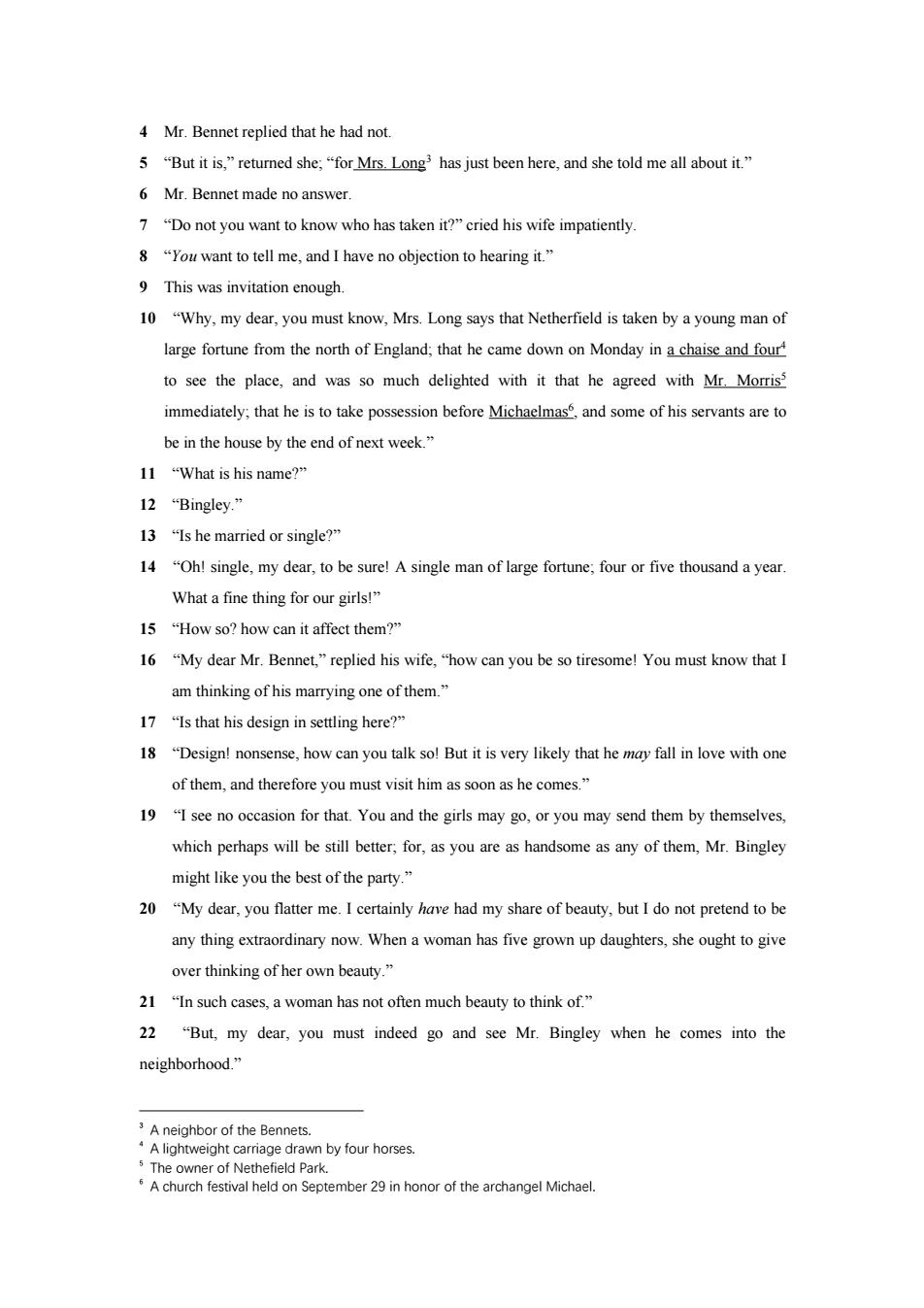
4 Mr.Bennet replied that he had not. 5“But it is,”returned she,“for Mrs.Long3 has just been here,and she told me all about it..” 6 Mr.Bennet made no answer. 7 "Do not you want to know who has taken it?"cried his wife impatiently. 8 "You want to tell me,and I have no objection to hearing it." 9 This was invitation enough. 10 "Why,my dear,you must know,Mrs.Long says that Netherfield is taken by a young man of large fortune from the north of England:that he came down on Monday in a chaise and four to see the place,and was so much delighted with it that he agreed with Mr.Morriss immediately;that he is to take possession before Michaelmas,and some of his servants are to be in the house by the end of next week." 11 What is his name?” 12“Bingley.n l3“Is he married or single?” 14 "Oh!single,my dear,to be sure!A single man of large fortune;four or five thousand a year. What a fine thing for our girls!" 15 "How so?how can it affect them?" 16 "My dear Mr.Bennet,"replied his wife,"how can you be so tiresome!You must know that I am thinking of his marrying one of them." 17“Is that his design in settling here?” 18 "Design!nonsense,how can you talk so!But it is very likely that he may fall in love with one of them,and therefore you must visit him as soon as he comes." 19 "I see no occasion for that.You and the girls may go,or you may send them by themselves, which perhaps will be still better,for,as you are as handsome as any of them,Mr.Bingley might like you the best of the party." 20 "My dear,you flatter me.I certainly have had my share of beauty,but I do not pretend to be any thing extraordinary now.When a woman has five grown up daughters,she ought to give over thinking of her own beauty." 21 "In such cases,a woman has not often much beauty to think of." 22 "But,my dear,you must indeed go and see Mr.Bingley when he comes into the neighborhood.” 3 A neighbor of the Bennets. A lightweight carriage drawn by four horses. 5 The owner of Nethefield Park. A church festival held on September 29 in honor of the archangel Michael
4 Mr. Bennet replied that he had not. 5 “But it is,” returned she; “for Mrs. Long 3 has just been here, and she told me all about it.” 6 Mr. Bennet made no answer. 7 “Do not you want to know who has taken it?” cried his wife impatiently. 8 “You want to tell me, and I have no objection to hearing it.” 9 This was invitation enough. 10 “Why, my dear, you must know, Mrs. Long says that Netherfield is taken by a young man of large fortune from the north of England; that he came down on Monday in a chaise and four 4 to see the place, and was so much delighted with it that he agreed with Mr. Morris 5 immediately; that he is to take possession before Michaelmas 6 , and some of his servants are to be in the house by the end of next week.” 11 “What is his name?” 12 “Bingley.” 13 “Is he married or single?” 14 “Oh! single, my dear, to be sure! A single man of large fortune; four or five thousand a year. What a fine thing for our girls!” 15 “How so? how can it affect them?” 16 “My dear Mr. Bennet,” replied his wife, “how can you be so tiresome! You must know that I am thinking of his marrying one of them.” 17 “Is that his design in settling here?” 18 “Design! nonsense, how can you talk so! But it is very likely that he may fall in love with one of them, and therefore you must visit him as soon as he comes.” 19 “I see no occasion for that. You and the girls may go, or you may send them by themselves, which perhaps will be still better; for, as you are as handsome as any of them, Mr. Bingley might like you the best of the party.” 20 “My dear, you flatter me. I certainly have had my share of beauty, but I do not pretend to be any thing extraordinary now. When a woman has five grown up daughters, she ought to give over thinking of her own beauty.” 21 “In such cases, a woman has not often much beauty to think of.” 22 “But, my dear, you must indeed go and see Mr. Bingley when he comes into the neighborhood.” 3 A neighbor of the Bennets. 4 A lightweight carriage drawn by four horses. 5 The owner of Nethefield Park. 6 A church festival held on September 29 in honor of the archangel Michael
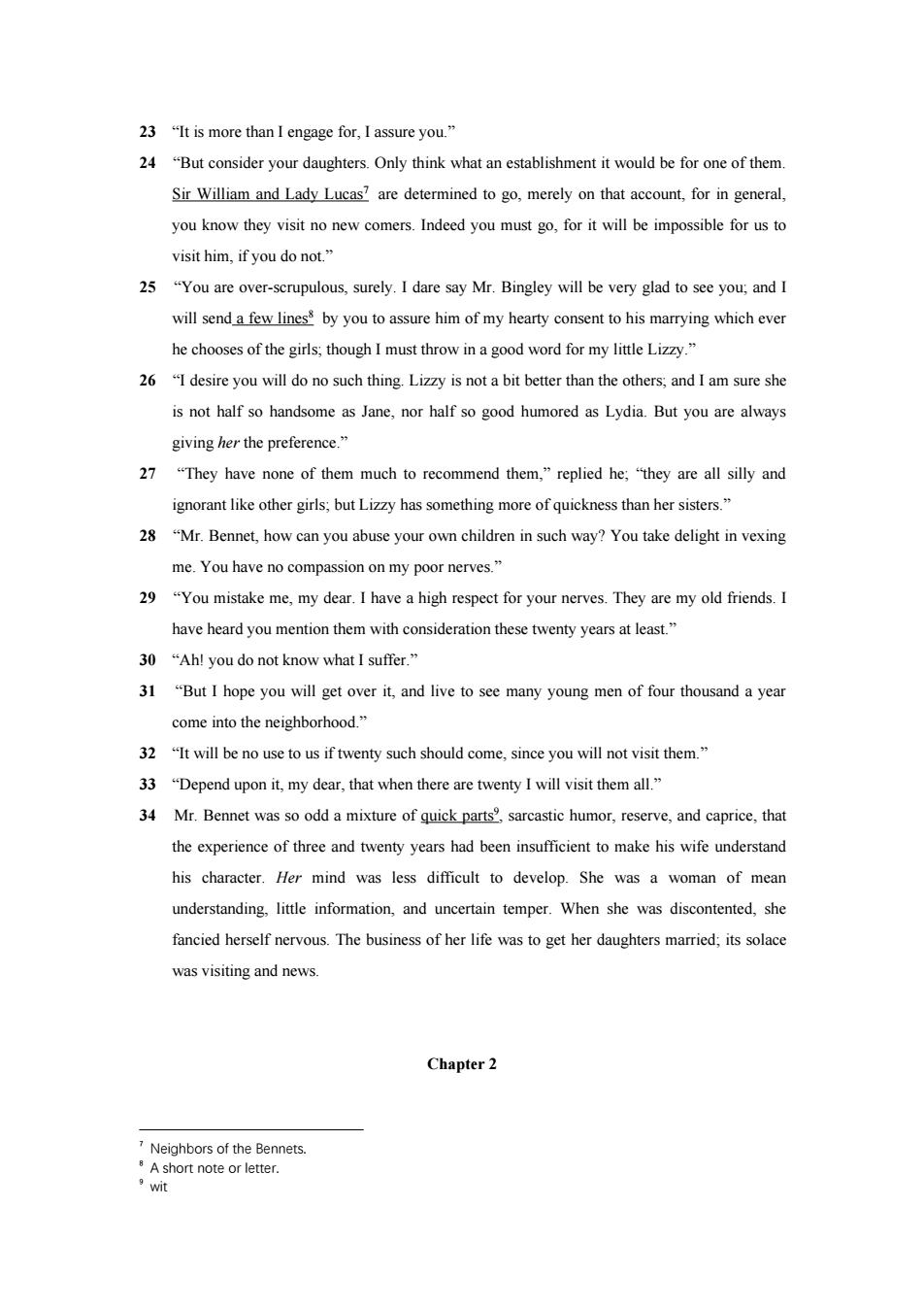
23 "It is more than I engage for,I assure you." 24 "But consider your daughters.Only think what an establishment it would be for one of them. Sir William and Lady Lucas?are determined to go,merely on that account,for in general, you know they visit no new comers.Indeed you must go,for it will be impossible for us to visit him,if you do not." 25 "You are over-scrupulous,surely.I dare say Mr.Bingley will be very glad to see you;and I will send a few liness by you to assure him of my hearty consent to his marrying which ever he chooses of the girls;though I must throw in a good word for my little Lizzy." 26 "I desire you will do no such thing.Lizzy is not a bit better than the others;and I am sure she is not half so handsome as Jane,nor half so good humored as Lydia.But you are always giving her the preference." 27 "They have none of them much to recommend them,"replied he;"they are all silly and ignorant like other girls;but Lizzy has something more of quickness than her sisters." 28 "Mr.Bennet,how can you abuse your own children in such way?You take delight in vexing me.You have no compassion on my poor nerves." 29 "You mistake me,my dear.I have a high respect for your nerves.They are my old friends.I have heard you mention them with consideration these twenty years at least." 30“Ah!you do not know what I suffer.” 31 "But I hope you will get over it,and live to see many young men of four thousand a year come into the neighborhood." 32 "It will be no use to us if twenty such should come,since you will not visit them." 33 "Depend upon it,my dear,that when there are twenty I will visit them all." 34 Mr.Bennet was so odd a mixture of quick parts3,sarcastic humor,reserve,and caprice,that the experience of three and twenty years had been insufficient to make his wife understand his character.Her mind was less difficult to develop.She was a woman of mean understanding,little information,and uncertain temper.When she was discontented,she fancied herself nervous.The business of her life was to get her daughters married;its solace was visiting and news. Chapter 2 7 Neighbors of the Bennets. A short note or letter. e wit
23 “It is more than I engage for, I assure you.” 24 “But consider your daughters. Only think what an establishment it would be for one of them. Sir William and Lady Lucas 7 are determined to go, merely on that account, for in general, you know they visit no new comers. Indeed you must go, for it will be impossible for us to visit him, if you do not.” 25 “You are over-scrupulous, surely. I dare say Mr. Bingley will be very glad to see you; and I will send a few lines 8 by you to assure him of my hearty consent to his marrying which ever he chooses of the girls; though I must throw in a good word for my little Lizzy.” 26 “I desire you will do no such thing. Lizzy is not a bit better than the others; and I am sure she is not half so handsome as Jane, nor half so good humored as Lydia. But you are always giving her the preference.” 27 “They have none of them much to recommend them,” replied he; “they are all silly and ignorant like other girls; but Lizzy has something more of quickness than her sisters.” 28 “Mr. Bennet, how can you abuse your own children in such way? You take delight in vexing me. You have no compassion on my poor nerves.” 29 “You mistake me, my dear. I have a high respect for your nerves. They are my old friends. I have heard you mention them with consideration these twenty years at least.” 30 “Ah! you do not know what I suffer.” 31 “But I hope you will get over it, and live to see many young men of four thousand a year come into the neighborhood.” 32 “It will be no use to us if twenty such should come, since you will not visit them.” 33 “Depend upon it, my dear, that when there are twenty I will visit them all.” 34 Mr. Bennet was so odd a mixture of quick parts 9 , sarcastic humor, reserve, and caprice, that the experience of three and twenty years had been insufficient to make his wife understand his character. Her mind was less difficult to develop. She was a woman of mean understanding, little information, and uncertain temper. When she was discontented, she fancied herself nervous. The business of her life was to get her daughters married; its solace was visiting and news. Chapter 2 7 Neighbors of the Bennets. 8 A short note or letter. 9 wit
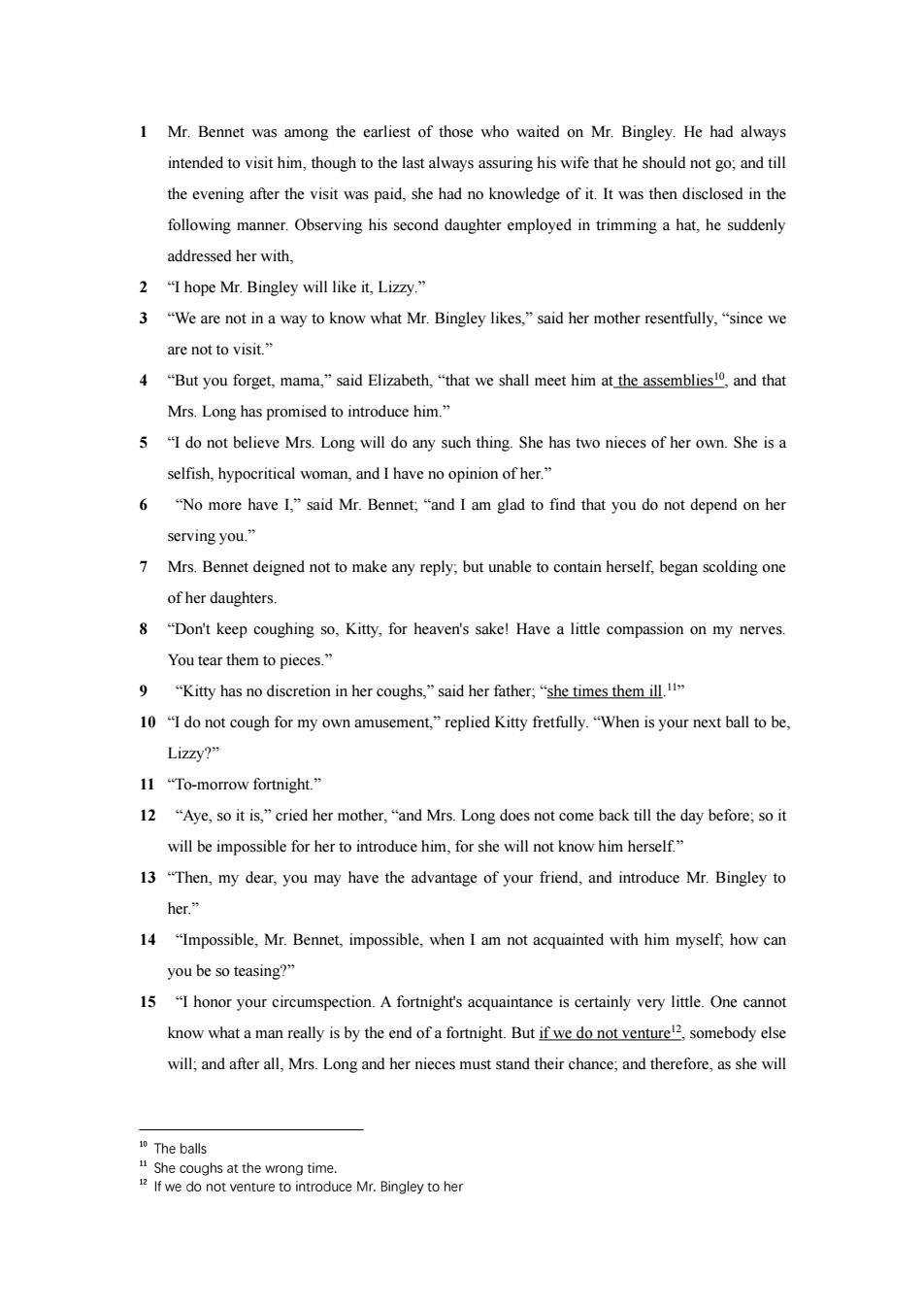
1 Mr.Bennet was among the earliest of those who waited on Mr.Bingley.He had always intended to visit him,though to the last always assuring his wife that he should not go;and till the evening after the visit was paid,she had no knowledge of it.It was then disclosed in the following manner.Observing his second daughter employed in trimming a hat,he suddenly addressed her with. 2 "I hope Mr.Bingley will like it,Lizzy." 3 "We are not in a way to know what Mr.Bingley likes,"said her mother resentfully,"since we are not to visit..” 4 "But you forget,mama,"said Elizabeth,"that we shall meet him at the assemblieso and that Mrs.Long has promised to introduce him." 5 "I do not believe Mrs.Long will do any such thing.She has two nieces of her own.She is a selfish,hypocritical woman,and I have no opinion of her." 6 "No more have I,"said Mr.Bennet;"and I am glad to find that you do not depend on her serving you.” 7 Mrs.Bennet deigned not to make any reply;but unable to contain herself,began scolding one of her daughters. 8 "Don't keep coughing so,Kitty,for heaven's sake!Have a little compassion on my nerves. You tear them to pieces." 9 "Kitty has no discretion in her coughs,"said her father;"she times them ill." 10 "I do not cough for my own amusement,"replied Kitty fretfully."When is your next ball to be, Lizzy?” 11 "To-morrow fortnight." 12 "Aye,so it is,"cried her mother,"and Mrs.Long does not come back till the day before;so it will be impossible for her to introduce him,for she will not know him herself." 13 "Then,my dear,you may have the advantage of your friend,and introduce Mr.Bingley to her.” 14 "Impossible,Mr.Bennet,impossible,when I am not acquainted with him myself,how can you be so teasing?” 15 "I honor your circumspection.A fortnight's acquaintance is certainly very little.One cannot know what a man really is by the end of a fortnight.But if we do not venture2,somebody else will;and after all,Mrs.Long and her nieces must stand their chance;and therefore,as she will 10 The balls 4She coughs at the wrong time. 1 If we do not venture to introduce Mr.Bingley to her
1 Mr. Bennet was among the earliest of those who waited on Mr. Bingley. He had always intended to visit him, though to the last always assuring his wife that he should not go; and till the evening after the visit was paid, she had no knowledge of it. It was then disclosed in the following manner. Observing his second daughter employed in trimming a hat, he suddenly addressed her with, 2 “I hope Mr. Bingley will like it, Lizzy.” 3 “We are not in a way to know what Mr. Bingley likes,” said her mother resentfully, “since we are not to visit.” 4 “But you forget, mama,” said Elizabeth, “that we shall meet him at the assemblies 10 , and that Mrs. Long has promised to introduce him.” 5 “I do not believe Mrs. Long will do any such thing. She has two nieces of her own. She is a selfish, hypocritical woman, and I have no opinion of her.” 6 “No more have I,” said Mr. Bennet; “and I am glad to find that you do not depend on her serving you.” 7 Mrs. Bennet deigned not to make any reply; but unable to contain herself, began scolding one of her daughters. 8 “Don't keep coughing so, Kitty, for heaven's sake! Have a little compassion on my nerves. You tear them to pieces.” 9 “Kitty has no discretion in her coughs,” said her father; “she times them ill.11” 10 “I do not cough for my own amusement,” replied Kitty fretfully. “When is your next ball to be, Lizzy?” 11 “To-morrow fortnight.” 12 “Aye, so it is,” cried her mother, “and Mrs. Long does not come back till the day before; so it will be impossible for her to introduce him, for she will not know him herself.” 13 “Then, my dear, you may have the advantage of your friend, and introduce Mr. Bingley to her.” 14 “Impossible, Mr. Bennet, impossible, when I am not acquainted with him myself; how can you be so teasing?” 15 “I honor your circumspection. A fortnight's acquaintance is certainly very little. One cannot know what a man really is by the end of a fortnight. But if we do not venture 12 , somebody else will; and after all, Mrs. Long and her nieces must stand their chance; and therefore, as she will 10 The balls 11 She coughs at the wrong time. 12 If we do not venture to introduce Mr. Bingley to her
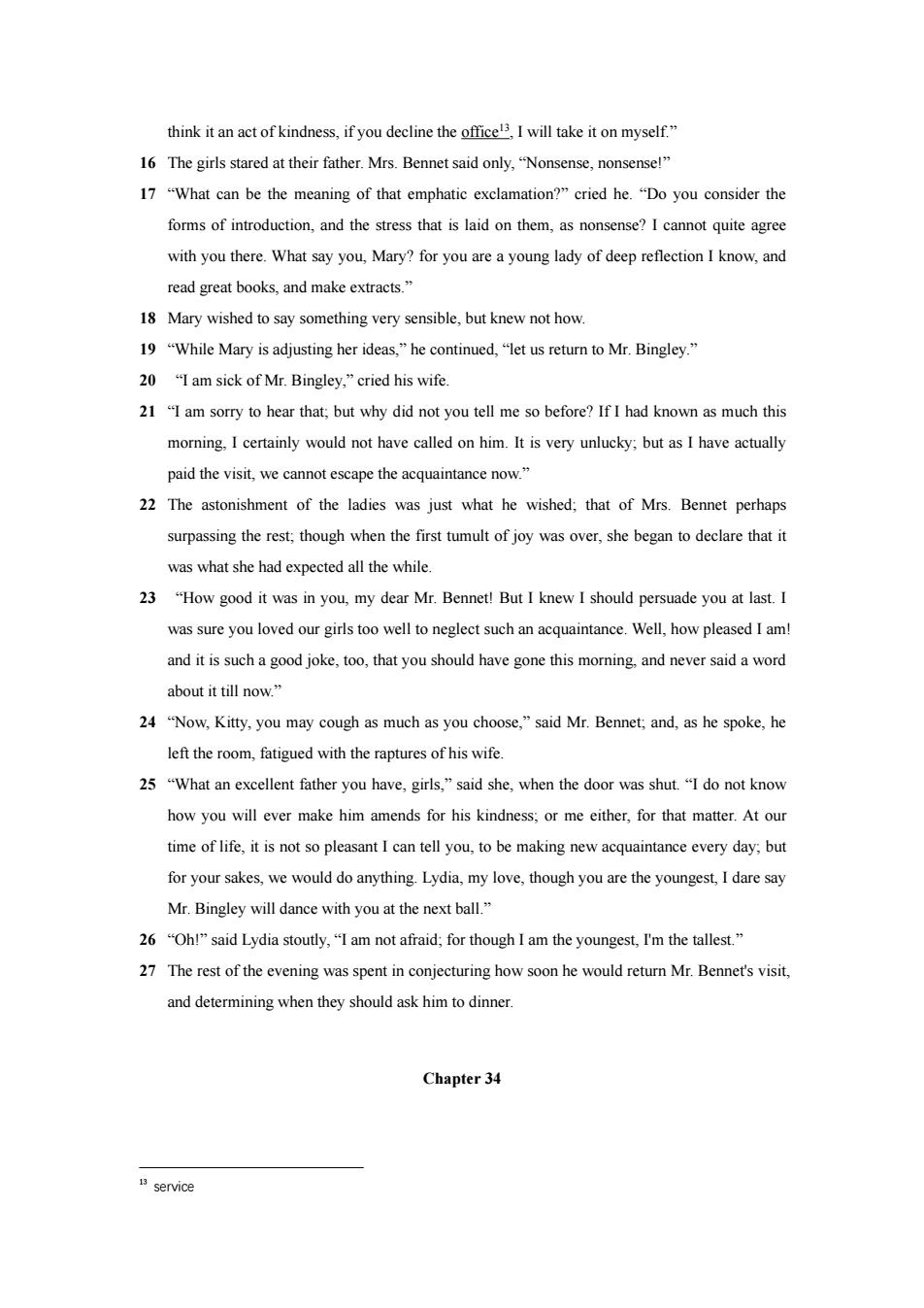
think it an act of kindness,if you decline the office3,I will take it on myself." 16 The girls stared at their father.Mrs.Bennet said only,"Nonsense,nonsense!" 17 "What can be the meaning of that emphatic exclamation?"cried he."Do you consider the forms of introduction,and the stress that is laid on them,as nonsense?I cannot quite agree with you there.What say you,Mary?for you are a young lady of deep reflection I know,and read great books,and make extracts." 18 Mary wished to say something very sensible,but knew not how. l9“While Mary is adjusting her ideas,”he continued,“let us return to Mr.Bingley.” 20 "I am sick of Mr.Bingley,"cried his wife. 21 "I am sorry to hear that;but why did not you tell me so before?If I had known as much this morning,I certainly would not have called on him.It is very unlucky;but as I have actually paid the visit,we cannot escape the acquaintance now." 22 The astonishment of the ladies was just what he wished;that of Mrs.Bennet perhaps surpassing the rest;though when the first tumult of joy was over,she began to declare that it was what she had expected all the while. 23 "How good it was in you,my dear Mr.Bennet!But I knew I should persuade you at last.I was sure you loved our girls too well to neglect such an acquaintance.Well,how pleased I am! and it is such a good joke,too,that you should have gone this morning,and never said a word about it till now.” 24 "Now,Kitty,you may cough as much as you choose,"said Mr.Bennet;and,as he spoke,he left the room,fatigued with the raptures of his wife. 25 "What an excellent father you have,girls,"said she,when the door was shut."I do not know how you will ever make him amends for his kindness;or me either,for that matter.At our time of life,it is not so pleasant I can tell you,to be making new acquaintance every day;but for your sakes,we would do anything.Lydia,my love,though you are the youngest,I dare say Mr.Bingley will dance with you at the next ball." 26“Ohl”said Lydia stoutly,“I am not afraid,for though I am the youngest,.I'm the tallest..” 27 The rest of the evening was spent in conjecturing how soon he would return Mr.Bennet's visit, and determining when they should ask him to dinner. Chapter 34 1 service
think it an act of kindness, if you decline the office 13 , I will take it on myself.” 16 The girls stared at their father. Mrs. Bennet said only, “Nonsense, nonsense!” 17 “What can be the meaning of that emphatic exclamation?” cried he. “Do you consider the forms of introduction, and the stress that is laid on them, as nonsense? I cannot quite agree with you there. What say you, Mary? for you are a young lady of deep reflection I know, and read great books, and make extracts.” 18 Mary wished to say something very sensible, but knew not how. 19 “While Mary is adjusting her ideas,” he continued, “let us return to Mr. Bingley.” 20 “I am sick of Mr. Bingley,” cried his wife. 21 “I am sorry to hear that; but why did not you tell me so before? If I had known as much this morning, I certainly would not have called on him. It is very unlucky; but as I have actually paid the visit, we cannot escape the acquaintance now.” 22 The astonishment of the ladies was just what he wished; that of Mrs. Bennet perhaps surpassing the rest; though when the first tumult of joy was over, she began to declare that it was what she had expected all the while. 23 “How good it was in you, my dear Mr. Bennet! But I knew I should persuade you at last. I was sure you loved our girls too well to neglect such an acquaintance. Well, how pleased I am! and it is such a good joke, too, that you should have gone this morning, and never said a word about it till now.” 24 “Now, Kitty, you may cough as much as you choose,” said Mr. Bennet; and, as he spoke, he left the room, fatigued with the raptures of his wife. 25 “What an excellent father you have, girls,” said she, when the door was shut. “I do not know how you will ever make him amends for his kindness; or me either, for that matter. At our time of life, it is not so pleasant I can tell you, to be making new acquaintance every day; but for your sakes, we would do anything. Lydia, my love, though you are the youngest, I dare say Mr. Bingley will dance with you at the next ball.” 26 “Oh!” said Lydia stoutly, “I am not afraid; for though I am the youngest, I'm the tallest.” 27 The rest of the evening was spent in conjecturing how soon he would return Mr. Bennet's visit, and determining when they should ask him to dinner. Chapter 34 13 service
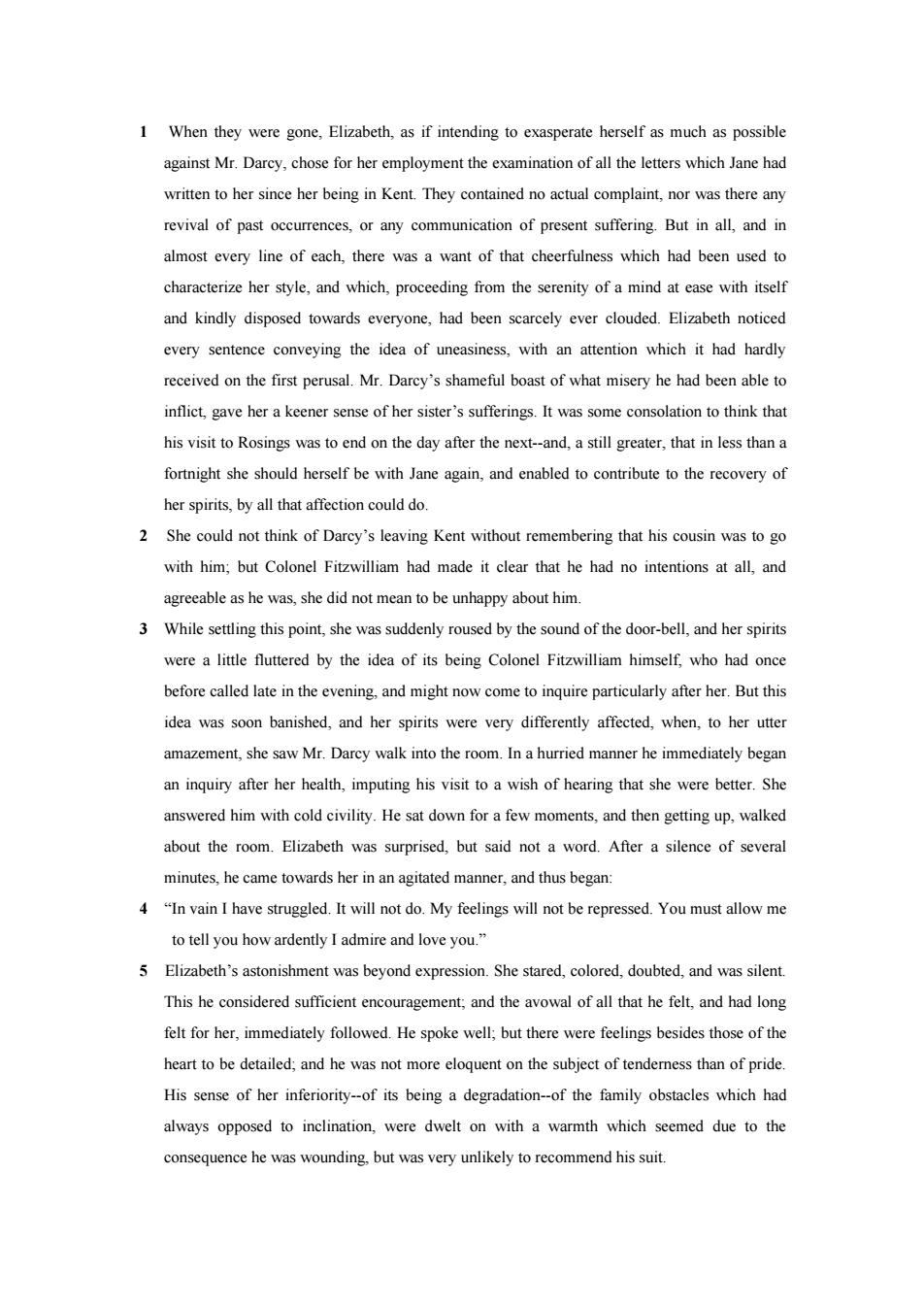
1 When they were gone,Elizabeth,as if intending to exasperate herself as much as possible against Mr.Darcy,chose for her employment the examination of all the letters which Jane had written to her since her being in Kent.They contained no actual complaint,nor was there any revival of past occurrences,or any communication of present suffering.But in all,and in almost every line of each,there was a want of that cheerfulness which had been used to characterize her style,and which,proceeding from the serenity of a mind at ease with itself and kindly disposed towards everyone,had been scarcely ever clouded.Elizabeth noticed every sentence conveying the idea of uneasiness,with an attention which it had hardly received on the first perusal.Mr.Darcy's shameful boast of what misery he had been able to inflict,gave her a keener sense of her sister's sufferings.It was some consolation to think that his visit to Rosings was to end on the day after the next--and,a still greater,that in less than a fortnight she should herself be with Jane again,and enabled to contribute to the recovery of her spirits,by all that affection could do 2 She could not think of Darcy's leaving Kent without remembering that his cousin was to go with him;but Colonel Fitzwilliam had made it clear that he had no intentions at all,and agreeable as he was,she did not mean to be unhappy about him. 3 While settling this point,she was suddenly roused by the sound of the door-bell,and her spirits were a little fluttered by the idea of its being Colonel Fitzwilliam himself,who had once before called late in the evening,and might now come to inquire particularly after her.But this idea was soon banished,and her spirits were very differently affected,when,to her utter amazement,she saw Mr.Darcy walk into the room.In a hurried manner he immediately began an inquiry after her health,imputing his visit to a wish of hearing that she were better.She answered him with cold civility.He sat down for a few moments,and then getting up,walked about the room.Elizabeth was surprised,but said not a word.After a silence of several minutes,he came towards her in an agitated manner,and thus began: 4 "In vain I have struggled.It will not do.My feelings will not be repressed.You must allow me to tell you how ardently I admire and love you." 5 Elizabeth's astonishment was beyond expression.She stared,colored,doubted,and was silent. This he considered sufficient encouragement;and the avowal of all that he felt,and had long felt for her,immediately followed.He spoke well;but there were feelings besides those of the heart to be detailed;and he was not more eloquent on the subject of tenderness than of pride. His sense of her inferiority--of its being a degradation--of the family obstacles which had always opposed to inclination,were dwelt on with a warmth which seemed due to the consequence he was wounding,but was very unlikely to recommend his suit
1 When they were gone, Elizabeth, as if intending to exasperate herself as much as possible against Mr. Darcy, chose for her employment the examination of all the letters which Jane had written to her since her being in Kent. They contained no actual complaint, nor was there any revival of past occurrences, or any communication of present suffering. But in all, and in almost every line of each, there was a want of that cheerfulness which had been used to characterize her style, and which, proceeding from the serenity of a mind at ease with itself and kindly disposed towards everyone, had been scarcely ever clouded. Elizabeth noticed every sentence conveying the idea of uneasiness, with an attention which it had hardly received on the first perusal. Mr. Darcy’s shameful boast of what misery he had been able to inflict, gave her a keener sense of her sister’s sufferings. It was some consolation to think that his visit to Rosings was to end on the day after the next--and, a still greater, that in less than a fortnight she should herself be with Jane again, and enabled to contribute to the recovery of her spirits, by all that affection could do. 2 She could not think of Darcy’s leaving Kent without remembering that his cousin was to go with him; but Colonel Fitzwilliam had made it clear that he had no intentions at all, and agreeable as he was, she did not mean to be unhappy about him. 3 While settling this point, she was suddenly roused by the sound of the door-bell, and her spirits were a little fluttered by the idea of its being Colonel Fitzwilliam himself, who had once before called late in the evening, and might now come to inquire particularly after her. But this idea was soon banished, and her spirits were very differently affected, when, to her utter amazement, she saw Mr. Darcy walk into the room. In a hurried manner he immediately began an inquiry after her health, imputing his visit to a wish of hearing that she were better. She answered him with cold civility. He sat down for a few moments, and then getting up, walked about the room. Elizabeth was surprised, but said not a word. After a silence of several minutes, he came towards her in an agitated manner, and thus began: 4 “In vain I have struggled. It will not do. My feelings will not be repressed. You must allow me to tell you how ardently I admire and love you.” 5 Elizabeth’s astonishment was beyond expression. She stared, colored, doubted, and was silent. This he considered sufficient encouragement; and the avowal of all that he felt, and had long felt for her, immediately followed. He spoke well; but there were feelings besides those of the heart to be detailed; and he was not more eloquent on the subject of tenderness than of pride. His sense of her inferiority--of its being a degradation--of the family obstacles which had always opposed to inclination, were dwelt on with a warmth which seemed due to the consequence he was wounding, but was very unlikely to recommend his suit
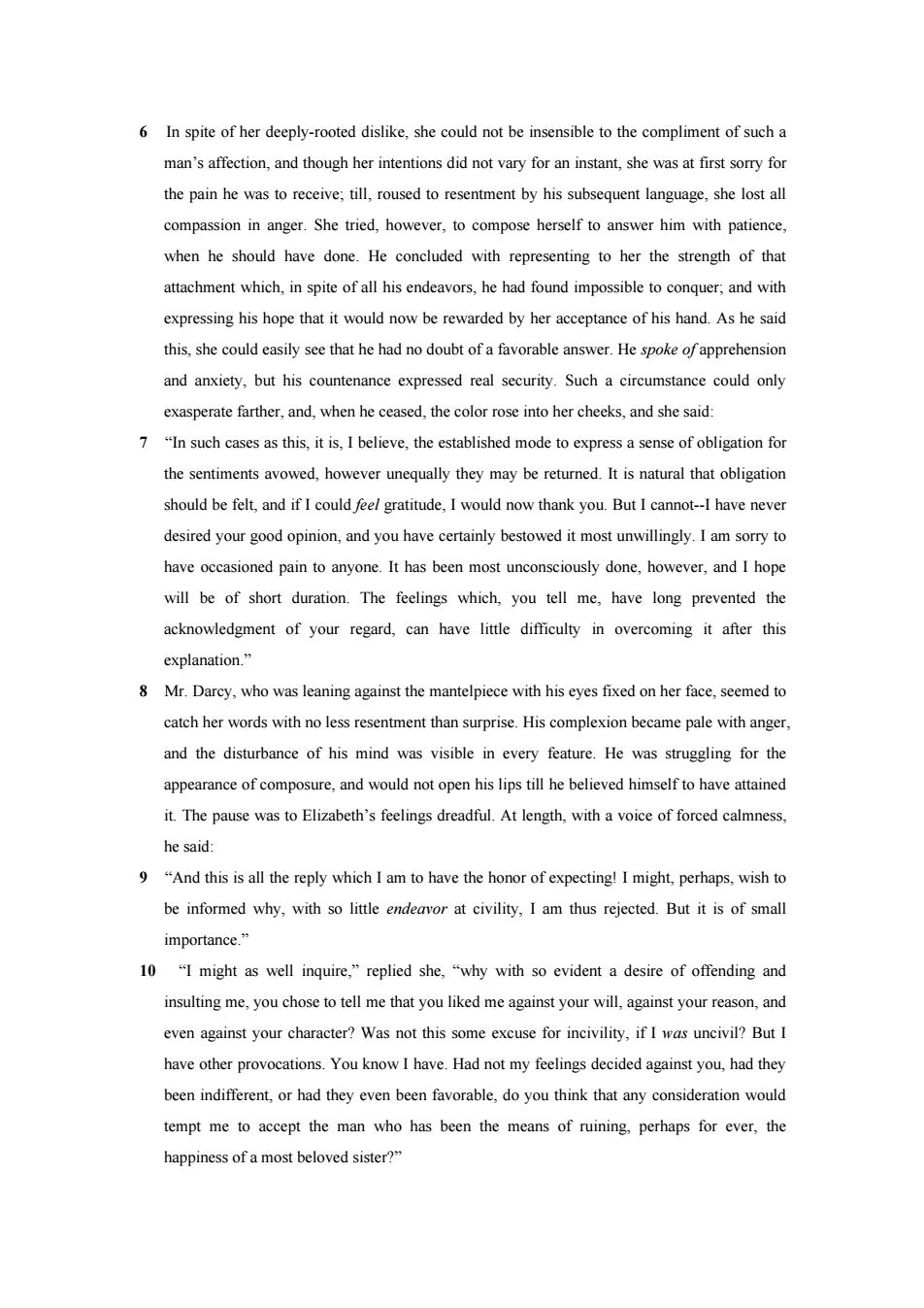
6 In spite of her deeply-rooted dislike,she could not be insensible to the compliment of such a man's affection,and though her intentions did not vary for an instant,she was at first sorry for the pain he was to receive;till,roused to resentment by his subsequent language,she lost all compassion in anger.She tried,however,to compose herself to answer him with patience, when he should have done.He concluded with representing to her the strength of that attachment which,in spite of all his endeavors,he had found impossible to conquer;and with expressing his hope that it would now be rewarded by her acceptance of his hand.As he said this,she could easily see that he had no doubt of a favorable answer.He spoke ofapprehension and anxiety,but his countenance expressed real security.Such a circumstance could only exasperate farther,and,when he ceased,the color rose into her cheeks,and she said: 7 "In such cases as this,it is,I believe,the established mode to express a sense of obligation for the sentiments avowed,however unequally they may be returned.It is natural that obligation should be felt,and if I could feel gratitude,I would now thank you.But I cannot--I have never desired your good opinion,and you have certainly bestowed it most unwillingly.I am sorry to have occasioned pain to anyone.It has been most unconsciously done,however,and I hope will be of short duration.The feelings which,you tell me,have long prevented the acknowledgment of your regard,can have little difficulty in overcoming it after this explanation..” 8 Mr.Darcy,who was leaning against the mantelpiece with his eyes fixed on her face,seemed to catch her words with no less resentment than surprise.His complexion became pale with anger, and the disturbance of his mind was visible in every feature.He was struggling for the appearance of composure,and would not open his lips till he believed himself to have attained it.The pause was to Elizabeth's feelings dreadful.At length,with a voice of forced calmness, he said: 9 "And this is all the reply which I am to have the honor of expecting!I might,perhaps,wish to be informed why,with so little endeavor at civility,I am thus rejected.But it is of small importance.” 10 "I might as well inquire,"replied she,"why with so evident a desire of offending and insulting me,you chose to tell me that you liked me against your will,against your reason,and even against your character?Was not this some excuse for incivility,if I was uncivil?But I have other provocations.You know I have.Had not my feelings decided against you,had they been indifferent,or had they even been favorable,do you think that any consideration would tempt me to accept the man who has been the means of ruining,perhaps for ever,the happiness of a most beloved sister?
6 In spite of her deeply-rooted dislike, she could not be insensible to the compliment of such a man’s affection, and though her intentions did not vary for an instant, she was at first sorry for the pain he was to receive; till, roused to resentment by his subsequent language, she lost all compassion in anger. She tried, however, to compose herself to answer him with patience, when he should have done. He concluded with representing to her the strength of that attachment which, in spite of all his endeavors, he had found impossible to conquer; and with expressing his hope that it would now be rewarded by her acceptance of his hand. As he said this, she could easily see that he had no doubt of a favorable answer. He spoke of apprehension and anxiety, but his countenance expressed real security. Such a circumstance could only exasperate farther, and, when he ceased, the color rose into her cheeks, and she said: 7 “In such cases as this, it is, I believe, the established mode to express a sense of obligation for the sentiments avowed, however unequally they may be returned. It is natural that obligation should be felt, and if I could feel gratitude, I would now thank you. But I cannot--I have never desired your good opinion, and you have certainly bestowed it most unwillingly. I am sorry to have occasioned pain to anyone. It has been most unconsciously done, however, and I hope will be of short duration. The feelings which, you tell me, have long prevented the acknowledgment of your regard, can have little difficulty in overcoming it after this explanation.” 8 Mr. Darcy, who was leaning against the mantelpiece with his eyes fixed on her face, seemed to catch her words with no less resentment than surprise. His complexion became pale with anger, and the disturbance of his mind was visible in every feature. He was struggling for the appearance of composure, and would not open his lips till he believed himself to have attained it. The pause was to Elizabeth’s feelings dreadful. At length, with a voice of forced calmness, he said: 9 “And this is all the reply which I am to have the honor of expecting! I might, perhaps, wish to be informed why, with so little endeavor at civility, I am thus rejected. But it is of small importance.” 10 “I might as well inquire,” replied she, “why with so evident a desire of offending and insulting me, you chose to tell me that you liked me against your will, against your reason, and even against your character? Was not this some excuse for incivility, if I was uncivil? But I have other provocations. You know I have. Had not my feelings decided against you, had they been indifferent, or had they even been favorable, do you think that any consideration would tempt me to accept the man who has been the means of ruining, perhaps for ever, the happiness of a most beloved sister?